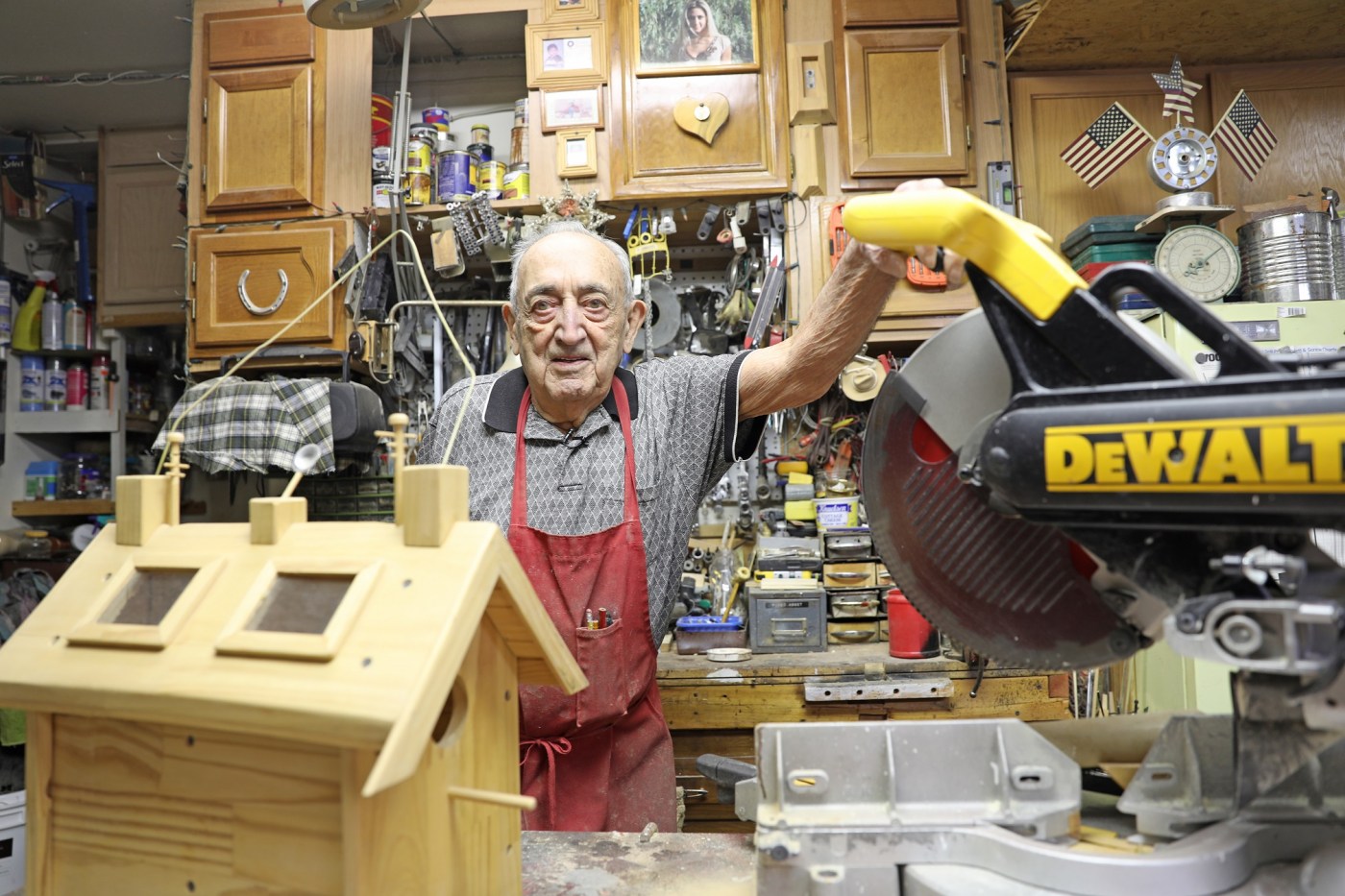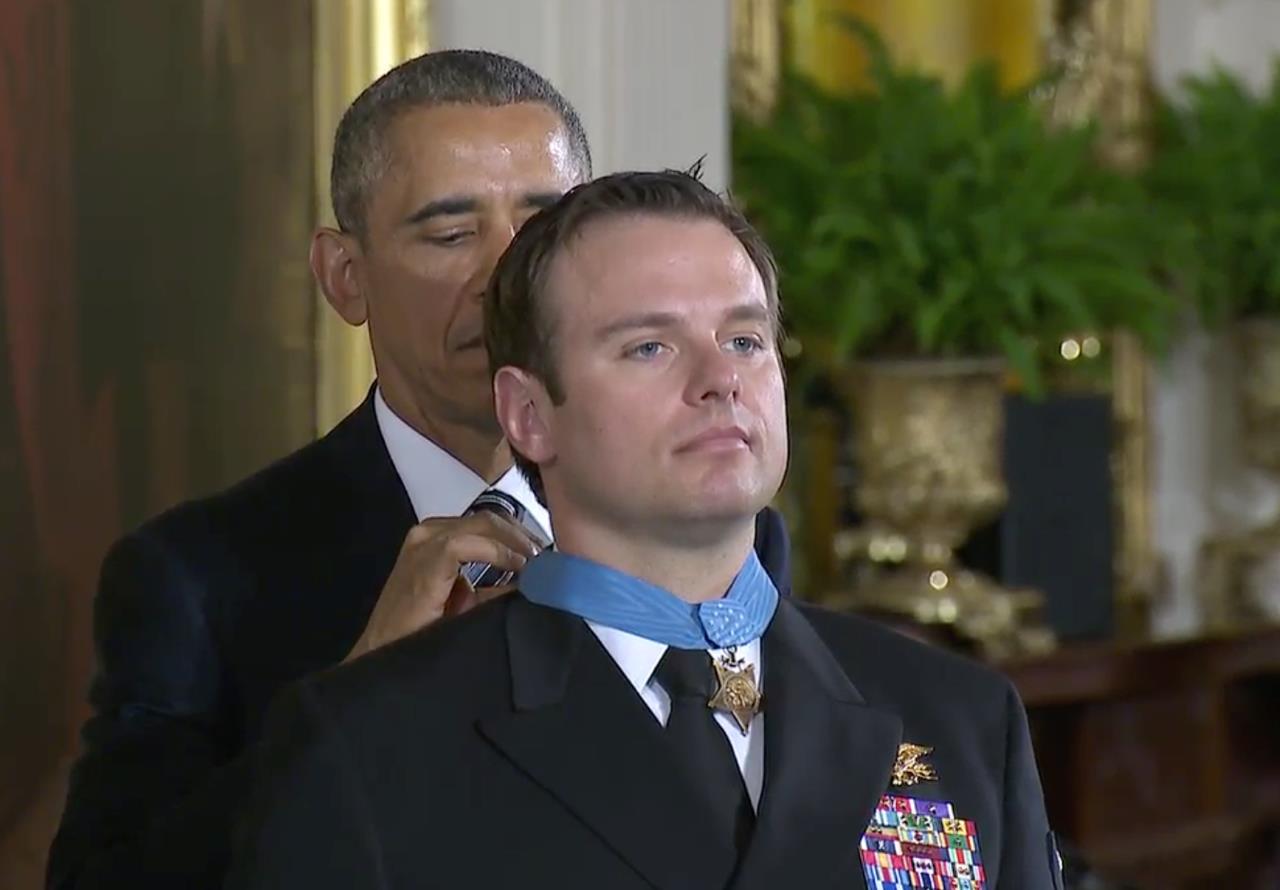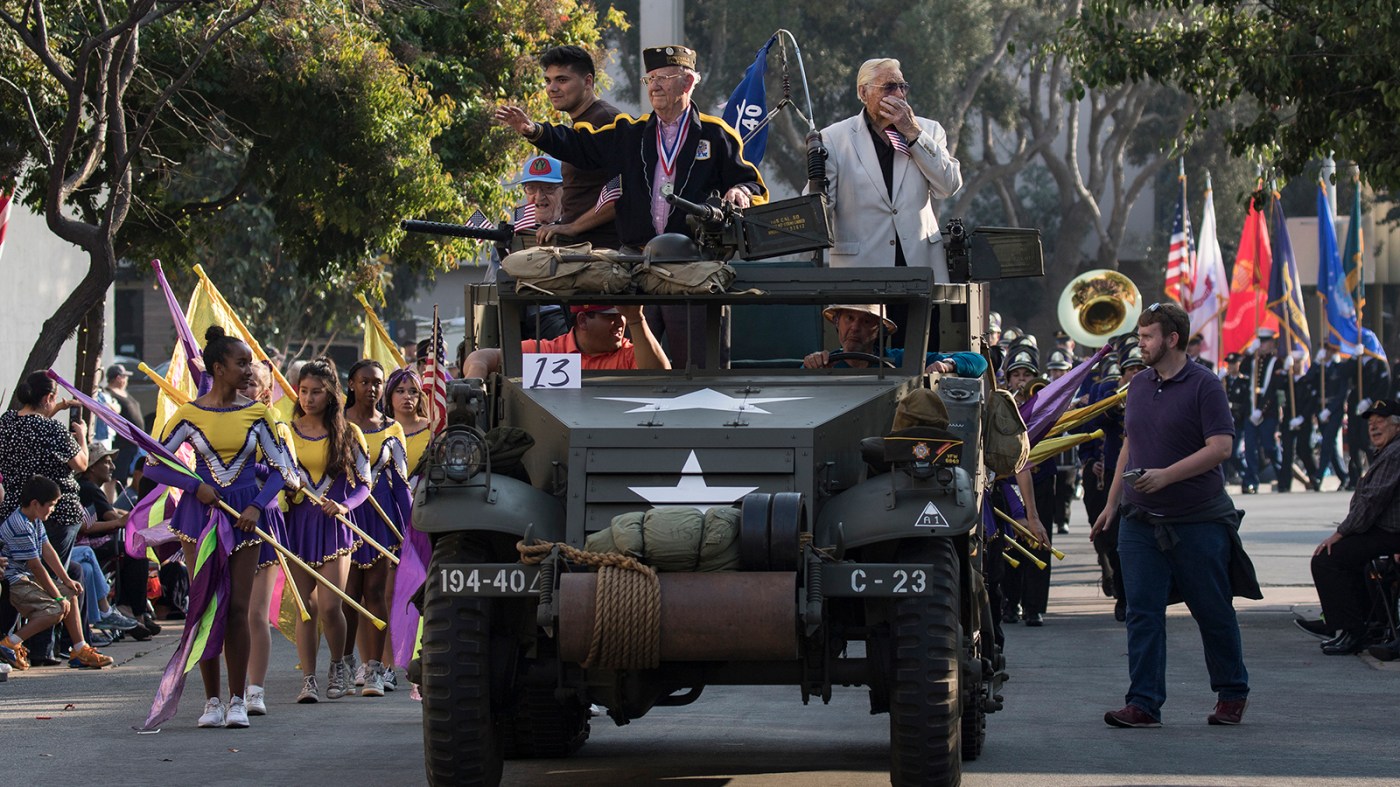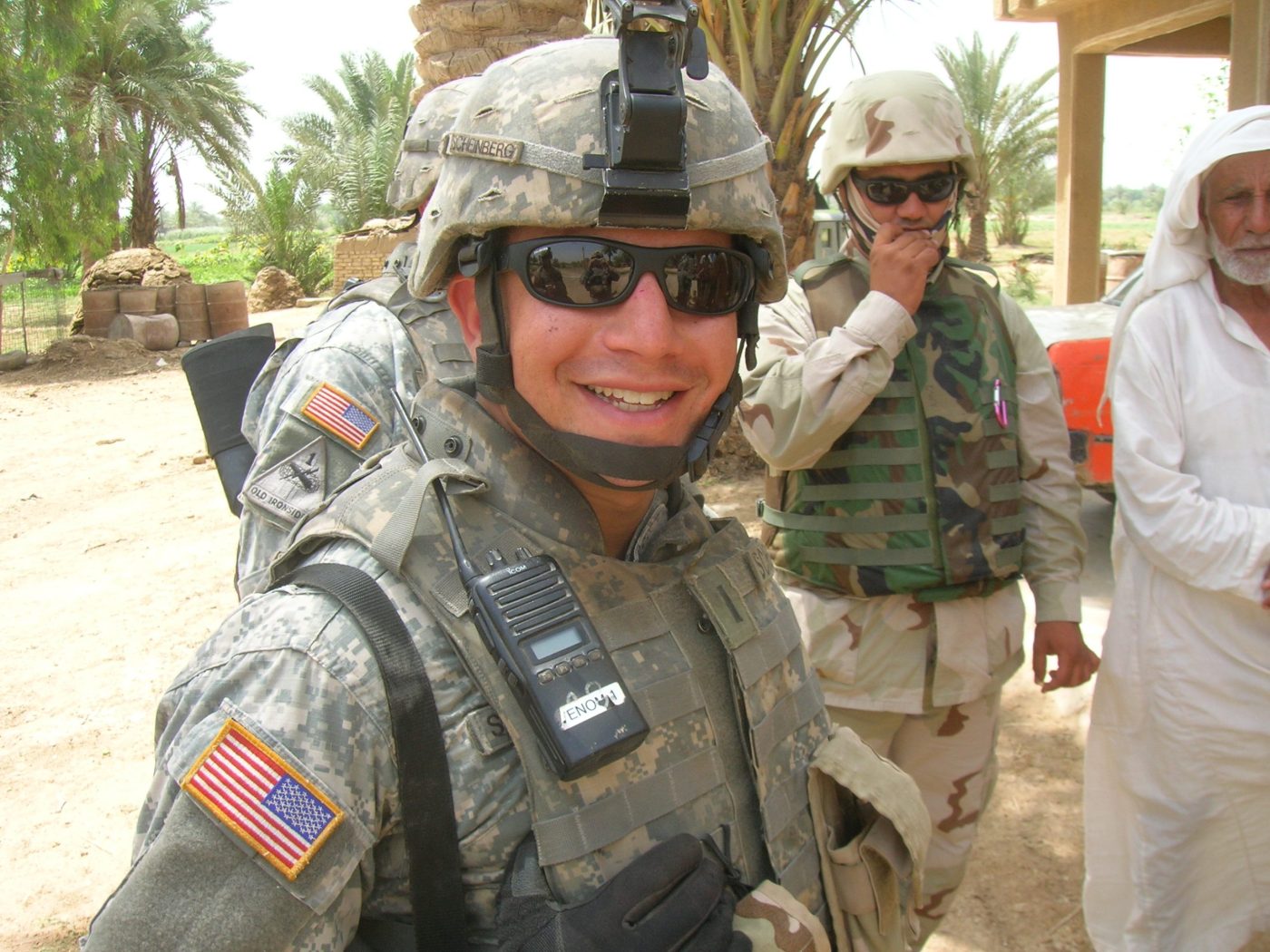On June 6, 1944, Onofrio “No-No” Zicari stormed Omaha Beach in one of the deadliest battles of World War II: D-Day. The 21-year-old New York native survived the sniper fire and artillery bombardment, enduring what he would later remember as one of the most harrowing memories of his life. The experience was so traumatic, it would give him nightmares for the remainder of his life. But at the suggestion of his caretaker and with the support of charitable donations, the 96-year-old Las Vegas resident is making his first trip back to France for the 75th anniversary of the D-Day landings.
“Maybe this will bring me some closure,” Zicari said. “So that’s why I’m going. Maybe there is something there that will help me put this all behind me. I’m 96 years old, how much longer can it go, you know?” he laughed. “Maybe I’ll see the beach.”
Zicari was offered the opportunity by Forever Young Senior Veterans, a nonprofit that organizes trips for veterans of U.S. wars, granting them an opportunity to return to the places they fought. Before he would accept the invitation, which includes joining a group of surviving World War II Veterans to travel to several sites in Normandy, Zicari had one stipulation — he needed his caretaker and family friend Diane Fazendin to accompany him. “If she wasn’t going, then I wasn’t going,” he said. A GoFundMe set up for Zicari raised $6,222, with nearly half of that coming from a donation from the Italian-American Club. With that amount, Fazendin can accompany Zicari throughout his journey, which begins June 3 and runs through June 10.
However, the logistics of travel hasn’t been the only thing keeping the D-Day Veteran from returning to France. The trauma of that day left Zicari with PTSD that continues to this day. “I was having nightmares, in fact, I just had one the other night. This all brings back a lot of memories for me,” he said.
To face those beaches again, Zicari found encouragement through his PTSD support group at VA Southern Nevada Healthcare System. The group of World War II, Korean, and Vietnam Veterans meets every Friday, and enjoys camaraderie in addition to the peer support. “They’ve really helped me,” he said. “It was a huge relief for me when I found this group. It wasn’t until I moved to Nevada 30 years ago that I enrolled at this VA. Another Vet told me about the PTSD support groups at the VA. So I said, ‘alright, I’ll go.’ I was relieved when I was talking to the other Veterans. They understood my feelings. And I’ve stayed right there with them for nearly 30 years.” When Zicari joined the group, there were six other World War II Veterans who regularly attended the meetings. “Now it’s just me,” he said.
Zicari was drafted into the Army at the age of 19, where he trained to become a supply soldier. After training for months for desert warfare in preparation for deployment to Northern Africa, he soon found himself in Scotland and Wales, preparing for a completely different kind of warfare. His company began practicing for amphibious landings in preparation for the inevitable invasion of continental Europe in what would eventually come to be known as Operation Overlord. “We knew we would have to go, but we didn’t know when,” Zicari said. That day, June 6, 1944, would soon arrive. Despite months of preparation of training, nothing could prepare him for what would come. “The night before, we were joking around. We didn’t know what to expect. We were all gung ho. Until we landed, then it stopped.”
The next morning, Zicari’s unit arrived in Normandy in preparation to land on Omaha Beach – the most heavily defended area of five sectors allied infantry and armored divisions would land on during the D-Day invasion. “We were the fifth or sixth wave to hit Omaha Beach,” he said. “Our landing craft was knocked out, it took a couple of direct hits and killed a couple of sailors that were on board. The boat got grounded on a reef. After it beached, we had to get off and landed in the water and almost drowned. I was the ammo man for a machine gun crew, and I carried two boxes of ammo, another guy carried two barrels, one carried a magazine, one carried the tri-pod, it was the five of us. Our gunner lost the barrels. He didn’t want to drown, so he just dropped them. I had the ammo, and I said, ‘what am I going to do with this ammo?’ So, I let go of the ammo.”
Once Zicari finally got his head above water, he was struck by the chaos that laid in front of him. “We didn’t know where we were,” he said. “All we kept hearing was ‘gotta go inland, gotta go inland! Can’t go back!’ But we got pinned down there for quite a long time. We saw a lot of dead soldiers. It was havoc. I can’t explain what war is. We were all gung ho before we landed, but once we saw what was going on, I said ‘I want to go home.’ A lot of prayers were said on that day, believe me.”
Zicari was able to join up with the remainder of his outfit, but struggled to shake loose many of the horrors around him. “I was in shock. I was numb. I didn’t know what to do. Everybody was lost. I got pinned down by a pillbox, and we had shells landing all over. I got up and went alongside a landing craft that was beached. I looked over and I see this redheaded soldier, and he was sitting on his helmet. He got hit bad. He looked at me and just started to laugh, ‘I’m going home, I’m going home.’ Whether he made it home or not, I don’t know. But that stuck with me.”
After several hours of intense fighting, Zicari was wounded by a piece of shrapnel in the knee. Although the wound was relatively light, medics recommended he seek immediate care. “They wanted to send me back to the hospital ship, but I told them no. I didn’t want to lose my outfit.” Zicari said. “They might send me to the infantry, and I didn’t want to go to the infantry, that’s for sure.”
When the intensity of the battle had died down, and the Germans were pushed back from their positions on the beachhead, Zicari and his unit had the task of bringing the ammunition and supplies onto the beaches. While the initial intensity of the fighting had decreased, they still faced occasional artillery and sniper fire. But the worst job was soon to come. “On the third day, we had to go back and pick up the bodies and equipment on the beaches,” he said. “After that, I never went back again. It was too sad.”
After Normandy, Zicari continued fighting across France, even making it to Belgium and relieving the 101st Airborne following the Battle of the Bulge in Bastogne and surrounding Ardennes Forest. But it was June 6 that would shape his memories of the war; memories that he hopes to put to rest 75 years later.
Following the war, Zicari moved to California with his wife, where they raised six children. His family became close friends with their neighbors, Fazendin and her husband. Even after the Zicaris moved to Nevada, they kept in touch. “We’ve been friends for many years,” said Fazendin, who currently lives in Florida and has acted as Zicari’s caretaker for a recent cruise and other short trips. This will be her first time traveling to Europe, and the furthest the two will travel together.
Zicari lives independently in his Las Vegas home, near much of his family. Even though he doesn’t own a cell phone or watch, he stays sharp by doing four crossword puzzles each day and completing woodworking projects. His garage is adorned with massive birdhouses and wooden trains that he has perfected over the years. He gets his socializing by meeting with his fellow Veterans at the VA. His PTSD peer support group even meets up for a holiday meal at the Medical Center cafeteria. And it was with their encouragement, the help of his caretaker, and financial support of charitable donations that Zicari will finally be able to make his return to Omaha Beach this June.
About the author: John Archiquette is a Public Affairs Specialist at the Las Vegas VA Medical Center
Topics in this story
More Stories
VA recently developed a pilot program providing direct and specialized assistance for the 65 living Medal of Honor recipients nationwide.
This year, Veterans Day ceremonies recognized by VA will be held in 66 communities throughout 34 states and the District of Columbia to honor the nation's veterans.
A personal reflection on generational service from VA Deputy Assistant Secretary Aaron Scheinberg.











WONDERFUL articles, very well written. Thank you.
USAF
26th FIS Okinawa (50s)